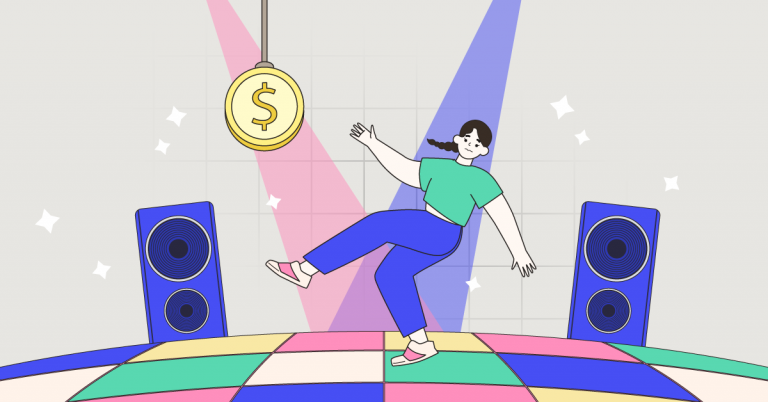My Financial Panic At The Micro-Retirement Disco

By now I’m sure that you, whether as an employer or employee with a thumb on the pulse of the cultural tides of the working crowd, have heard of the term, ‘micro-retirement’, or ‘mini-retirement’. It’s really just the Gen-Z term for taking a gap year, but for adults: it’s a pause from your career to mentally recharge and/or finally follow your dreams. It’s not the same as a sabbatical – which the baby boomers will know as a paid break from your job for a few months– but in many ways it can act as one.
Well, I decided to actually try micro-retirement. The cost of being burnt out was getting too great to justify monthly financial security, and it was time for a career break shift anyways. But I’d need a plan. So as I wrote up my resignation, I also did some reflecting and mapped out my situation. Financially, I had an emergency stash kept for times like this, exactly like all those finance articles stipulate. I was actually financially independent with no debt, so I could ration out my savings for the 3-6 months I planned out for my mini retirement. Mentally, besides being shrivelled up and crying out for a break, I sorted out my budget expectations for this season, namely that I would have to say ‘no’ more to spending. And I dived in.
Once I Stepped Onto The Dance Floor, I Realised I Had Two Left Feet
So here’s the thing: I thought I would be just fine money-wise. According to the general consensus, I, for my demographic, was better off in savings and had wayyyy less financial commitments than the average city-dwelling millennial Malaysian. Plus, I pre-planned so that my pinching pennies started maybe 2-3 months in advance to acclimatise myself to the new way of life.
However, reality is so much colder than what I envisioned. The sheen has worn off my new found freedom to reveal… disconcerting things about myself.
The Spotlight, The Self-Illusions, The Pressure
My prior spending habits, for one, were now under a magnifying glass. It turns out that lifestyle creep had a stronger hold on me than I realised, because –HEAR ME OUT–although I’m a pretty low maintenance person and over the years had actively adjusted my budgeting to AVOID that creep, I had gotten used to certain luxuries like impulse Shopee checkouts. And man. Holding back from retail therapy was uncomfortable, itchy, annoying, like the sticky heat of a sun-baked car.
Facing this issue recalled to mind my giveaway winning streak on social media off the end of covid. By streak, I mean like, winning 11 giveaways over the span of 18 months. And so, in the midst of my supposedly free and easy micro-retirment, my poor friends started receiving “Sarah tagged you in @facecream giveaway” notifications every few days. Hey, the allure of free stuff when you can’t shop y’know?
Cue The Panic

My biggest problem was that I also started getting worried unnecessarily about having enough money. The wild thing is that I actually DO, even after a few unexpected major expenses graciously availed themselves. My temporary micro-retirement budget remains solid. Regardless, I started scrutinising my ‘yes’es and started saying ‘no’ much more to a social life, something I did not foresee nor encountered before, even in university when money was tighter. But that’s just not how I want to spend my friendships, so to me, this was a PROBLEM.
Making dough was yet another unpredictability. Suddenly, I was willing to spend copious amounts of my time and effort just to make a few extra tens of ringgit on jobs that previously I wouldn’t have batted 3 eyelids at. On paper, it was a bit ridiculous because I used to hold a management-level position. It took me 2 thrifting booth weekends and many Carousel posts later to finally throw in the towel and work on my CV for freelance jobs.
What was my problem? I had a good safety net. I had planned and budgeted. Did others like me, financially secure, at a similar place in life, enjoying micro-retirement worry too? Was worrying about money when you already have enough superficial, or actually a survival instinct?
Or was it a Me problem?
“Do The Other Dancers Also Have Two Left Feet?”
I chatted with some friends about it. The first one, a fellow adulting friend I had made after I started work, had built up a modest passive income stream via investing during her working years. She has a self-admitted inability to save, so that was her way of creating a safety net. Her micro-retirement did not factor into that plan per se, nor did she do any sabbatical planning, but now she’s happily living off that passive income with no qualms, and that includes travelling and a car loan. However, that WILL run out eventually and she acknowledged that when that time comes, then she’ll worry. If only I could have her confidence.
Friend 2, one I got to know just last year, is married and part of a double income household. And with her own micro-retirement being absolutely rejuvenating, she’s ready to head back into the workforce–though without any great urgency–not because of the money, but because she still has passion for what she does. For her, mini retirement this time was more like a career pause, or a sabbatical, rather than a dreamchaser situation. However, it does help that it coincides with her surplus funds running low, and concern about paying off major loans are starting to creep in. Sounds almost like my own worries but still her worries are reasonable.
Looking at our situations, I guess it really boils down to our personalities. We all enjoyed our micro-retirement during the first month: eyes cleared, sleep was enough, minds were uplifted, faces brightened. Money was not on our minds. We’re all financially secure. Health-wise our mental health, sleep, and even physical health recovered. But after a while our paths diverged. One friend thrives on living in the moment and has enough money, so no worries there. The other one actually has legitimate concerns but is looking for her dream job now. But I have the money AND the concerns. What does that say about me?!
Dance To Your Own Song, For Your Own Self
After the chats and some deep probing, I surmised that my relationship with financial security is probably not as comfortable around uncertainty as I’d assume. Ironically, I found that out when I was supposed to be blissfully worry-free during micro-retirement. Anyhow, this season was a test on its own– how willing was I to watch my hard-earned financial security decrease, even though I could earn it back the moment I became employed?
I’m the clingy, insecure, and jealous partner here. The thing is, I guess it’s okay and normal to feel overprotective over my money, but when it starts taking over my life, seeping negatively into my actions, my habits, then it’s a red flag signaling that it’s time to see how I can work on making it healthy, for me. And probably the friends I always tag in giveaways.
FAQ
Micro-retirement is an intentional career break, lasting from several weeks to several months, that allows people to recharge, pursue personal interests, or gain new skills before returning to work. Unlike traditional retirement, it is not a permanent exit from the workforce but a temporary pause to avoid burnout or to invest in personal growth.
Yes, micro-retirement is often seen as a strategy within the broader FIRE movement, but it’s a distinct approach. While the traditional FIRE movement aims for complete early retirement from the workforce, micro-retirement involves taking planned, temporary breaks to travel, learn new skills, or recharge before returning to work.
A typical micro-retirement lasts anywhere from a few months to a couple of years, with common examples being three to twelve months.
Financially planning for a micro-retirement involves aggressive, intentional savings, detailed budgeting for the break, and a strategy for handling expenses, insurance, and taxes. It requires planning your finances during the break and your re-entry into the workforce.
It is not advisable to take a micro-retirement if you have significant debt, particularly high-interest consumer debt like credit cards, as it requires significant financial discipline and preparation. Before considering a micro-retirement, you should aim to pay off all non-mortgage debt, build a substantial emergency fund, and create a detailed budget for the break itself to avoid taking on new debt.









